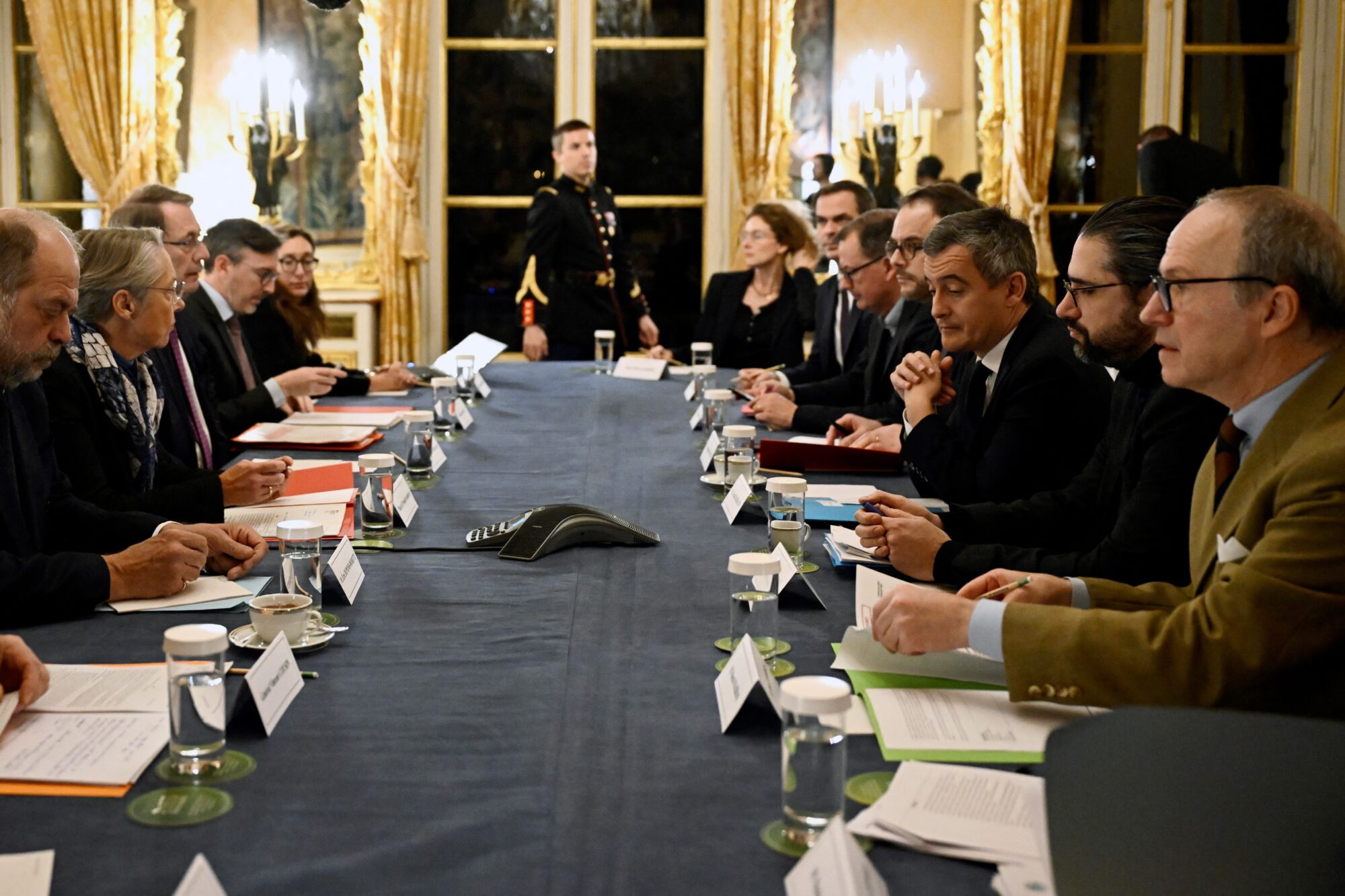
French Interior Minister Gerald Darmanin (third on right) attends a meeting with French Prime Minister Elisabeth Borne (second on left) and ministers a day after one person was killed and two others wounded in a terrorist attack in Paris.
Photo: Julien de Rosa / AFP
The dark series of crimes inflaming French public opinion continues with a murder in the heart of the capital on Saturday night, December 2nd. Once again, controversy has erupted over the identity of the assailant, which the media and the political class were at pains to conceal in order to avoid facing up to the harsh realities of Islamism and immigration.
The attack took place in southwest Paris, not far from the Seine and the Eiffel Tower. A German tourist was killed, and two other people were injured. The German tourist suffered several blows to the head, back, and shoulders. Two other people were injured in the attack. One of them, an English tourist, was hit in the eye with a hammer.
As soon as the attack was made public, the first information filtered through the press about the assailant: he was a Frenchman, born in France. The terms used by the news channels and echoed by Interior Minister Gérald Darmanin were unambiguous. It was the perfect counterexample to the Crépol tragedy, which had occurred two weeks earlier and was still the talk of the town, and which had been committed by young people of immigrant origin, none of whom had a traditional French-sounding name.
The Frenchman, born in France, went by the name of Armand R., we learned a few hours later. It couldn’t be more ‘French’: wasn’t du Plessis, Cardinal de Richelieu, once called Armand?
But investigative work by influencers on X revealed the deception. The murderer’s first name is Armand, but his surname is Rajabpour-Miyandoab. He was born in France in 1997 to Iranian parents and was naturalised. The individual was well known to the police and judicial authorities under the name Armand, but his given name at birth was Iman, which his parents changed to Armand in 2003—a change that the converted and radicalised young man disapproved of and wished to be called Iman again.
Discussions were rife on social media. The extract from the official gazette showing his naturalisation at the time when he was still called Iman was found. Once again, the work of clarifying the murderer’s profile was carried out via alternative channels instead of the official channels for disseminating information. This mirrors the Crépol affair, when it took the intervention of well-known right-wing whistleblowers in France, such as Damien Rieu, to reveal the names of the attackers, which had been deliberately hidden by the media.
Once again, there is a clear desire on the part of the press and those in power to hide the truth. On the BFM TV website, reference continues to be made to ‘Armand R.’ with no further details in order to maintain the vagueness about his origins.
Armand-Iman comes from a family that fled the mullahs’ Iran and was naturalised. The Left defends itself by explaining that the problem is not, strictly speaking, immigration and that this murder could not have been avoided. But the assailant’s background proves that France’s naturalisation policy is too generous and that the problem posed by Islamism remains unresolved. The murder was committed by Armand-Iman to cries of “Allah akbar,” and he made no secret of his motives: to defend Muslims under attack in Palestine and Afghanistan. He pledged his allegiance to the Islamic State.
Éric Zemmour has made the need to impose French first names on immigrants one of his favourite hobby horses. He was asked about the Armand-Iman case: his profile would prove that a French first name is no guarantee of anything. The polemicist replied that, on the contrary, his case was a demonstration of what he was trying to defend. Iman’s first name had been changed by his parents in order to facilitate his integration into French society, but the man did not recognise the change and reclaimed his original first name. His mother tried to alert the police to her son’s radicalisation but was ignored.
Once again, the French government has largely shirked its responsibilities. Interior Minister Gérald Darmanin believes that there was no fault on the part of his ministry, but simply that the medical follow-up of the murderer, who had already been convicted of a terrorist plot but had shown signs of psychological fragility, was lacking. But at the time of his terrorist plot in 2016, he was not considered insane since he was convicted.
As feminist Marguerite Stern explained with a certain irony on X, why do all unbalanced people shout “Allah akbar” and never “In the name of the Father?” Once again, the alibi of madness is put forward to explain Armand-Iman’s actions. But this time, several voices are speaking out against this ploy. Hugo Micheron, a specialist in jihadism and lecturer at the Institut d’Etudes Politiques (Sciences Po), spoke out on France Inter against the systematic temptation to psychologise Islamism. The act of murder is not a sign of madness but a response to a precise religious logic. Our Western society has deeply internalised non-violence, so much so that it can no longer consider that there can be such a thing as rational, considered acts of violence.
Attaque à Paris : "Je me méfie de cette approche qui viserait à sur-psychologiser l'individu." @MicheronH, spécialiste du djihadisme, maître de conférence à Sciences-Po souligne "l'environnement idéologique extrêmement marqué" de l'assaillant. #le710inter pic.twitter.com/PFwCbPMIG4
— France Inter (@franceinter) December 4, 2023
Although Gérald Darmanin acknowledges the murderer’s ability to intelligently exploit the “flaws in the system,” in the end it is nothing more than a “psychiatric failure.” The solution to the problem lies in giving prefects the power to issue “care orders.” Public blindness still has a long way to go.
